The Muscovy is a very unique duck. All modern domestic duck breeds are descendants of the Mallard — except the Muscovy. Like a donkey and horse are both equines, the Muscovy and Mallard (or any Mallard-derived breed) are both ducks, but separate species. Crossing a donkey with a horse will produce a sterile mule, and crossing a Muscovy with a duck will produce a sterile “mule duck.”
Muscovies are native to the Americas, and are now feral in many parts of the world, where they are often considered a nuisance, like pigeons. They are also called the Barbary duck. They were domesticated in Colombia and Peru sometime in the first century, around AD 50.
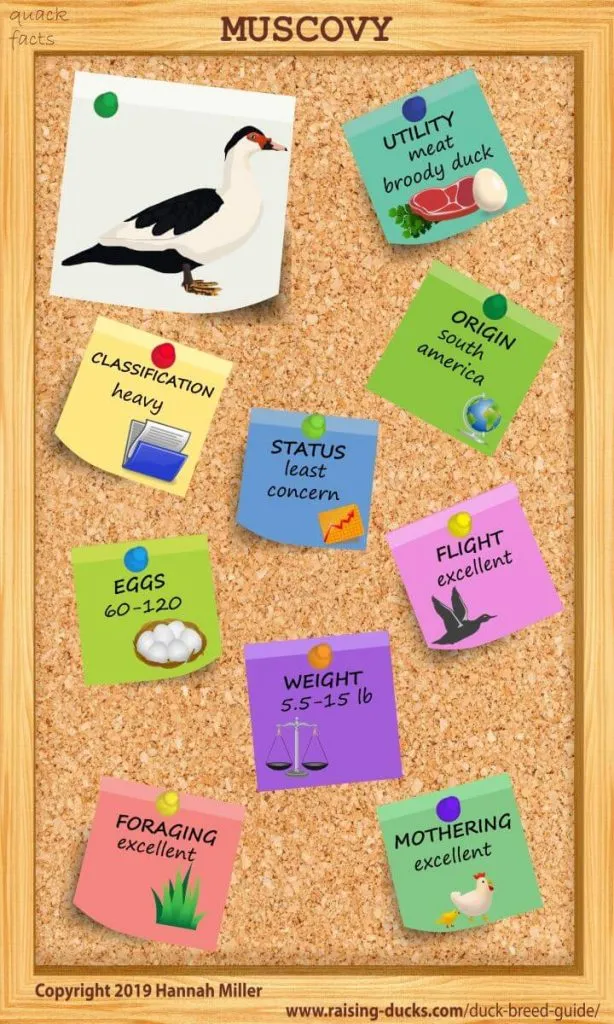
Muscovies come in a tremendous variety of colors. The wild Muscovy is black with a white patch on the wing.
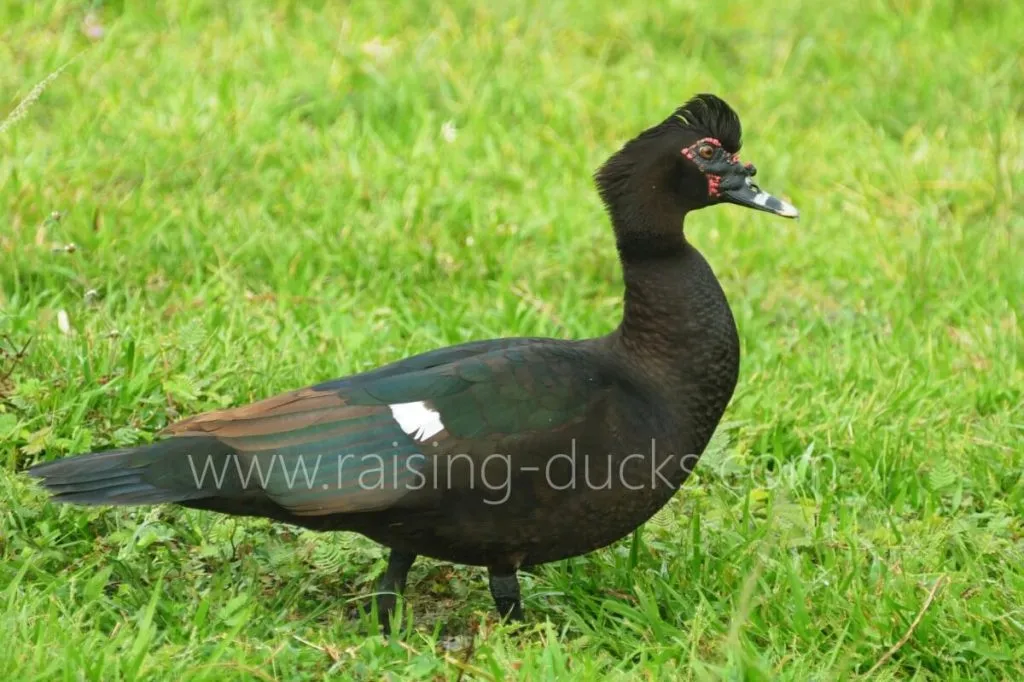
A true wild Muscovy duck.
Today, Muscovies can come in all-white, black, blue, chocolate, silver, lavender (self-blue), buff, blue fawn, lilac, pastel, and more. They can have a magpie (bi-colored) pattern, or they can have barred, laced, or rippled feather patterns.
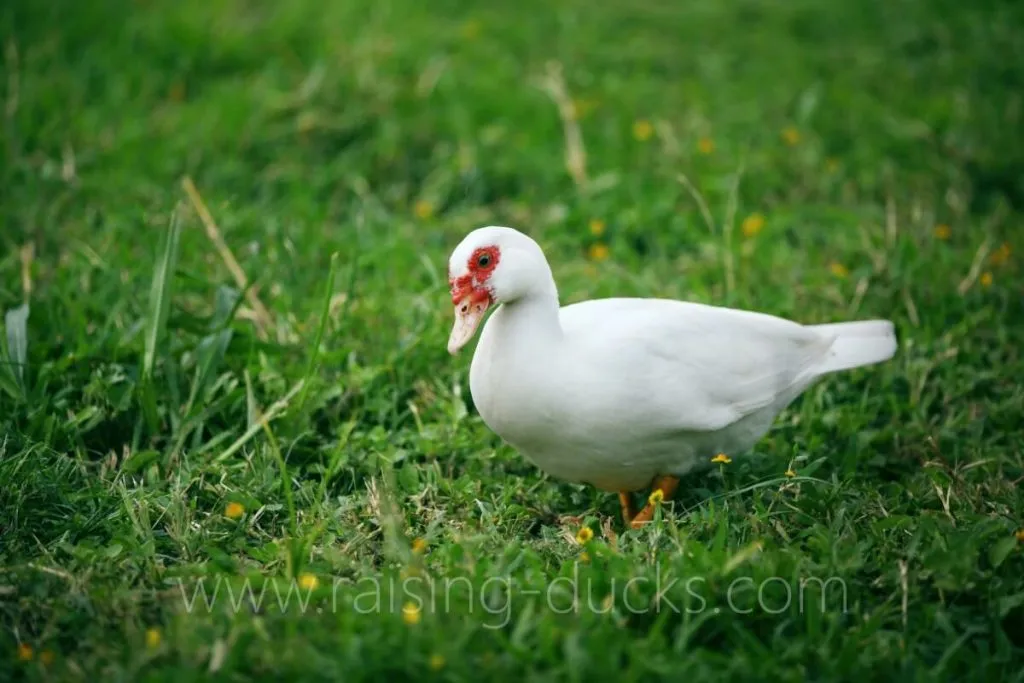
Some people find Muscovies to be “ugly” because of their caruncles, the red (sometimes partially black), warty “mask” around the face.
Their claws are long and sharp, like talons, so take care when handling them.
These ducks have a wide, flat tail that they wag like a dog. Why do Muscovies wag their tail? Some people say they wag their tail after a nervous experience or after some problem has been resolved (such as after they have been picked up and held), but they seem to also do it when they’re happy or while conversing with other ducks.
Also, while they enjoy swimming water, they aren’t as water repellent as other ducks because their oil glands are less developed, and swimming water isn’t as necessary for them as some other breeds. Some of mine only take a bath about once a month.
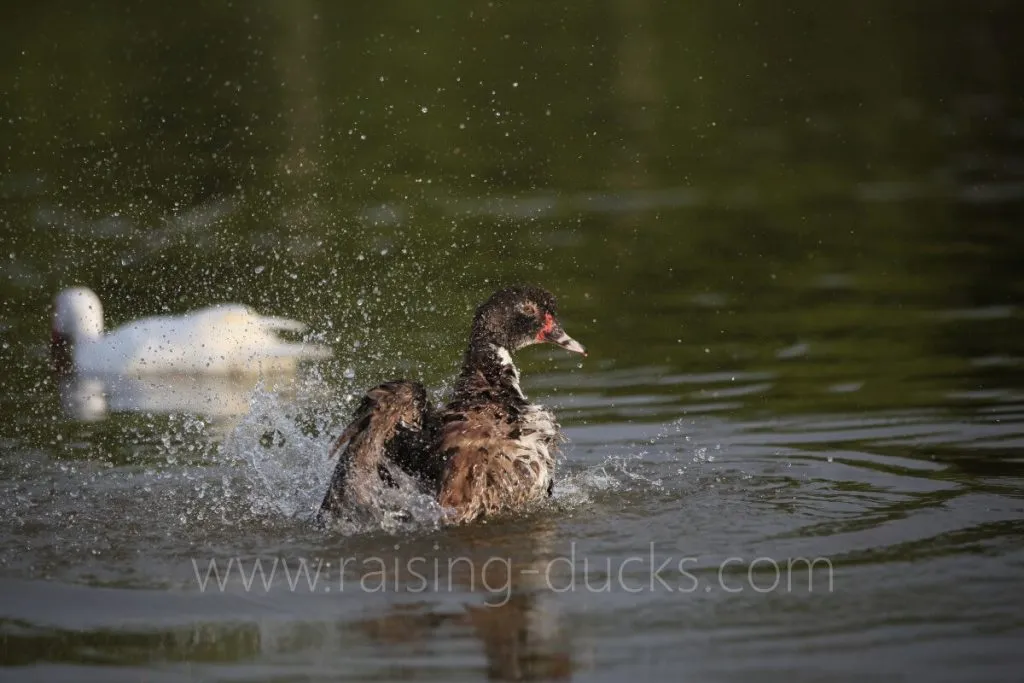
One of our ducks, Asha, taking a vigorous bath in the pond.
As adults, males and females are easily distinguishable to the trained eye. Males tend to be much larger than females, weighing about 9-15 pounds (4-7 kg), while females only weigh 5.5 to 7 pounds (2.5-3 kg).
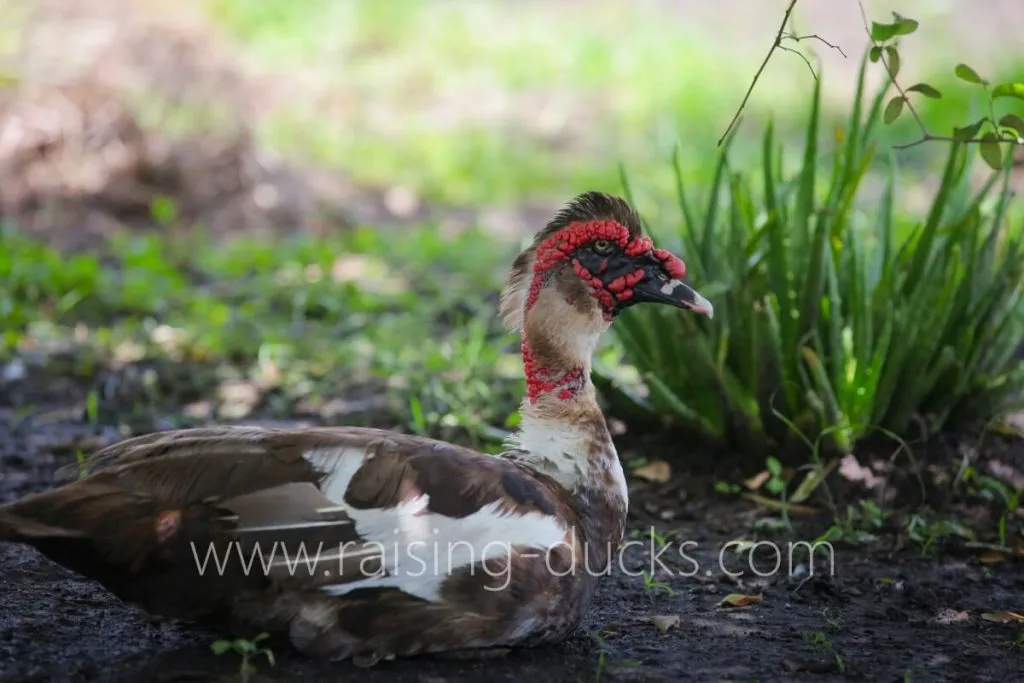
A mature Muscovy drake, about three years old, named Captain.
The caruncles of the males are also much more pronounced. Some females have only a trace of red caruncling around their eye and bill. Some drakes, on the other hand, have so much caruncling that they can barely see (I don’t approve of breeding Muscovies like this).
Male and female Muscovies have different voices as well. However, unlike Mallard-derived duck breeds, males do not develop curled “sex feathers.”
They have an erectile crest of feathers on their head, which they raise when they are excited or nervous. Males have larger crests than females.
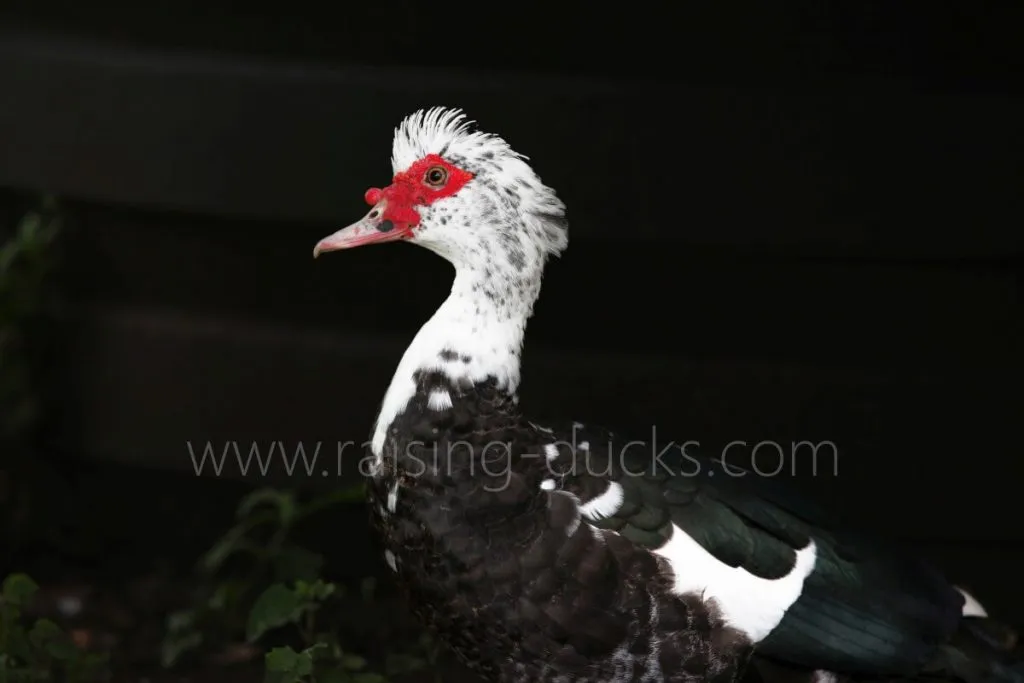
The crest of a female Muscovy duck. Her crest is quite tall for a female!
As juveniles, the males grow faster and develop caruncles before the females, while the females develop wing feathers earlier than the males.
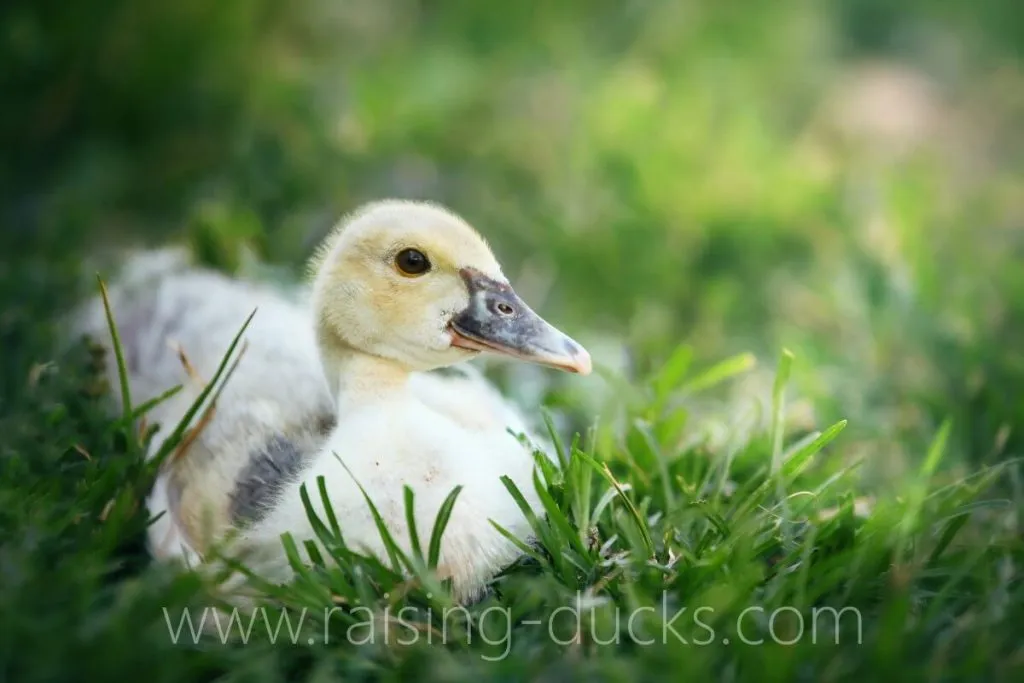
A young Muscovy duck.
Females will look feminine and slender whereas males will be chunkier and more masculine.
By eight weeks old, many experienced Muscovy owners can already identify the sex of their ducklings.
For more information and pictures, see 10 Effective Ways to Determine Your Muscovy Duck’s Gender (With Pictures).
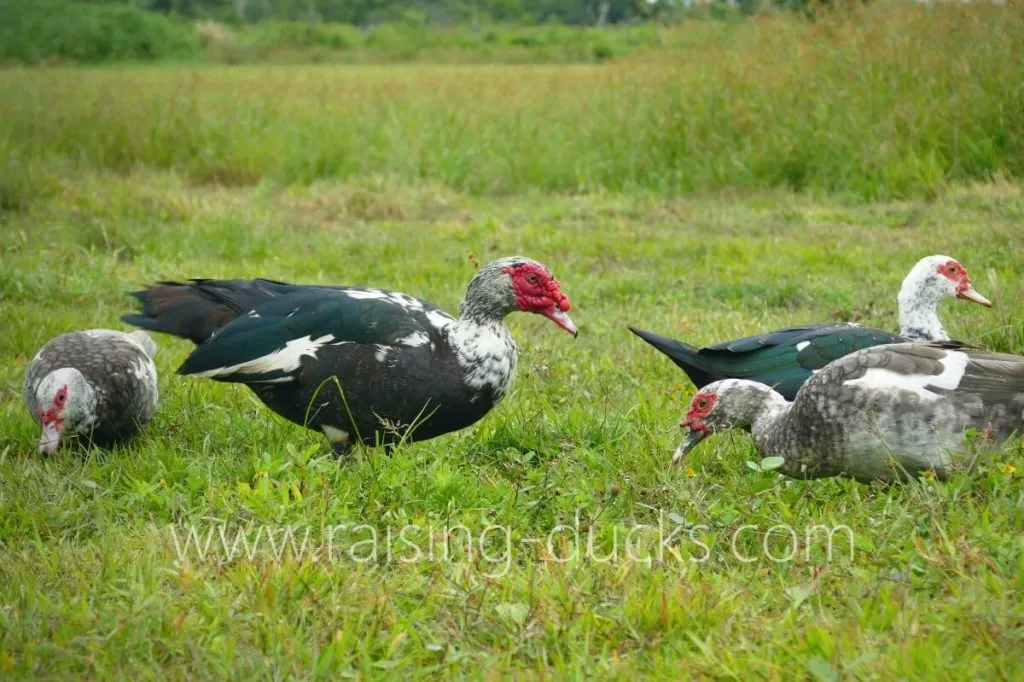
Male Muscovy ducks are much larger than female ducks.
In contrast to the noisy quacking of other ducks, Muscovies are quiet. However, although they are often called “mute ducks,” they aren’t completely silent.
Males produce a hoarse hissing or huffing sound, and females emit a variety of soft cooing, trilling, and whimpering/murmuring sounds.
Muscovies can occasionally make a loud quack-like honking sound when they are afraid or startled, and they squeak when they’re broody. From time to time the flock will also gather together and have a loud “conversation,” with all the ducks “talking” at once, but this is the loudest they get and even this isn’t likely to annoy anyone.
They’re the quietest of all the poultry. Chickens are noisy, geese are noisy, guineas are noisy, and female Mallard-derived ducks are noisy, but the Muscovy is, overall, quiet. If you would like poultry but need a breed that won’t disturb your neighbors, Muscovies may fit the bill.
Unlike other ducks, Muscovies perch. They don’t truly roost like chickens, but they enjoy perching on something.
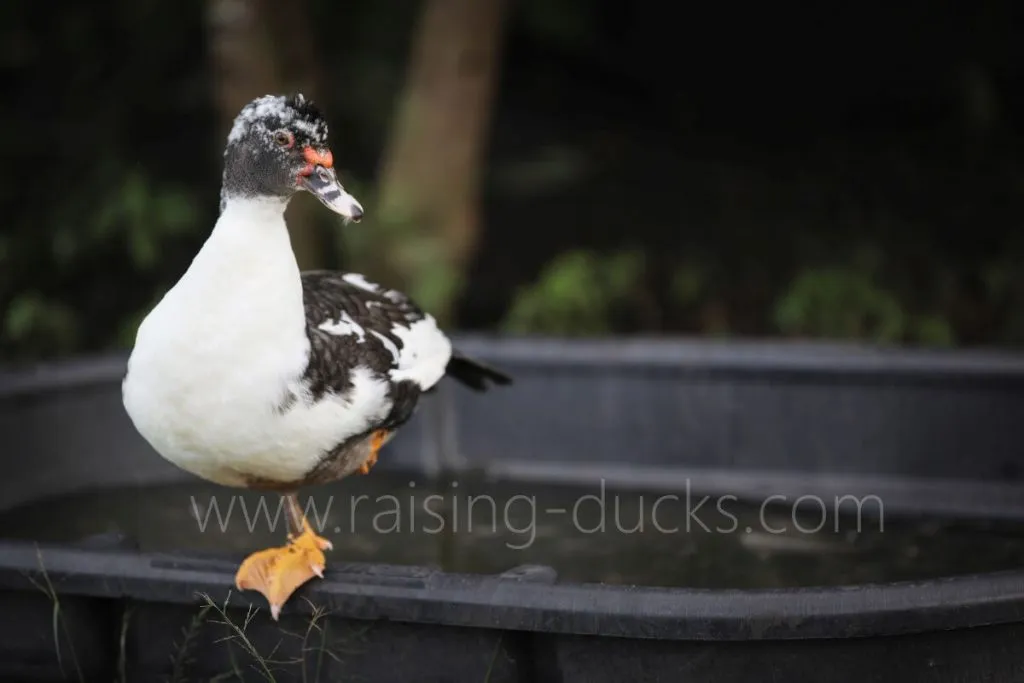
Oreo, a four-month-old Muscovy duck, perches on the side of her water tub. She tucks one of her legs up to rest it. Sometimes they tuck it into a pocket beneath their wing so their foot is completely invisible.
In the wild, they sleep in trees. They also enjoy sitting on concrete blocks, old piles of wood, tractors, wheelbarrows, or any raised object. Even if their wings are clipped, they can jump well.
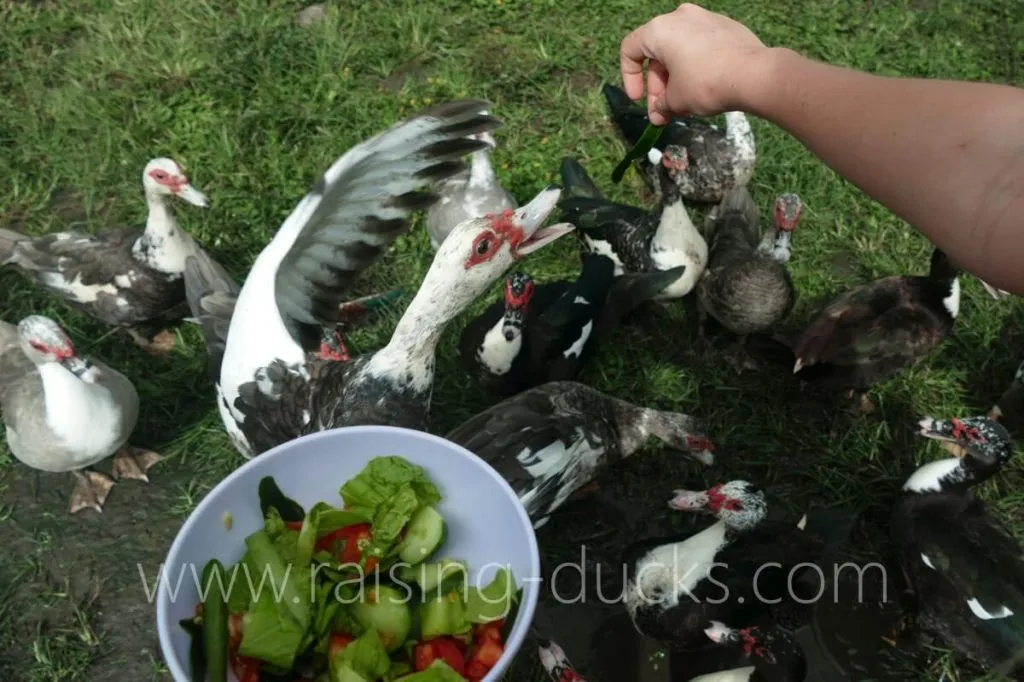
Muscovy ducks are good jumpers! Coffee, whose wings are clipped, leaps for a cucumber peel.
Females fly extraordinarily well and may have to be clipped, although in many modern strains, the males are too heavy to be airborne.
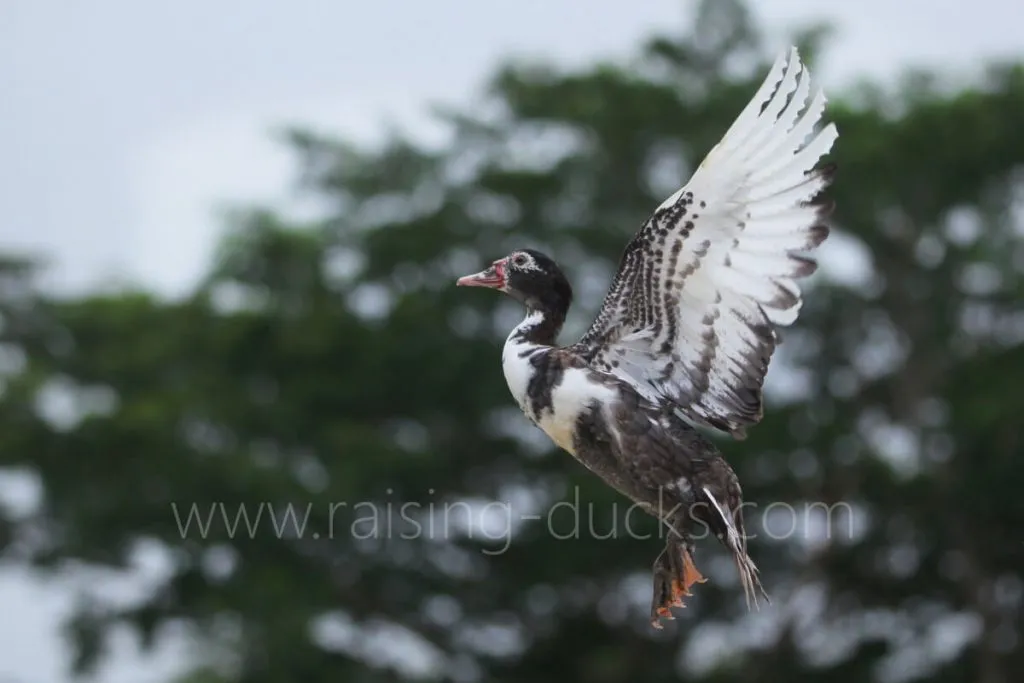
Muscovies are excellent fliers! Here, Kona flies onto the roof of our house.
Muscovies are also excellent foragers and can find a good portion of their own food.
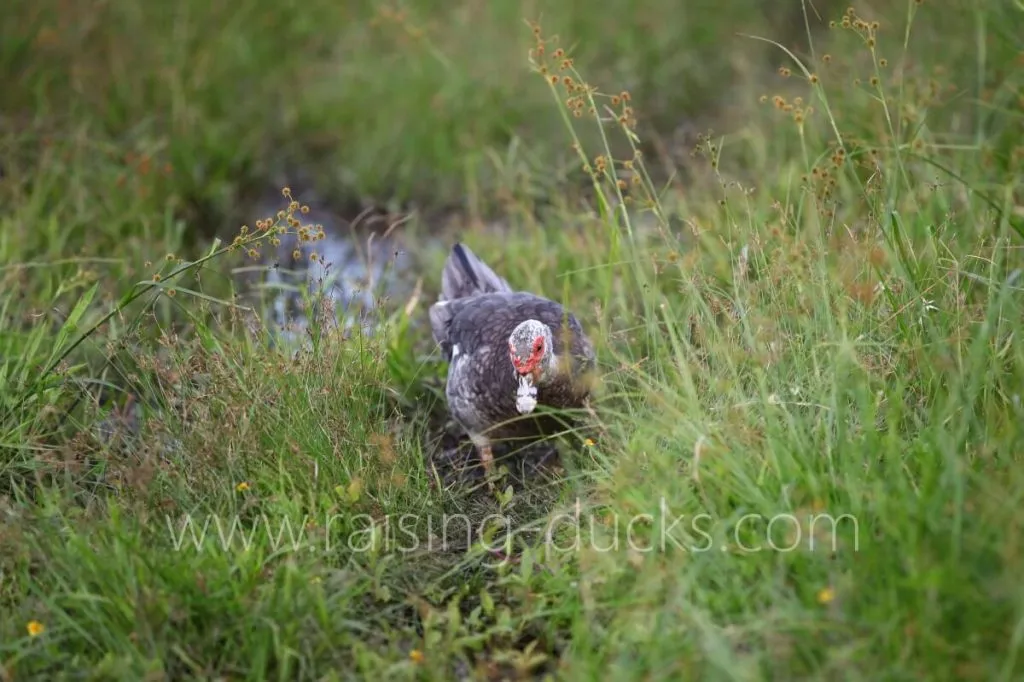
Muscovies spend a lot of their time foraging for food.
Muscovies lay 60-120 large white eggs a year.
Muscovies are tropical ducks and even prone to frostbite in cold climates. They are excellent mothers and frequently go broody. The incubation period for Muscovy eggs is 35 days, unlike the 28 days for most duck breeds. Muscovies are devoted and protective mothers.
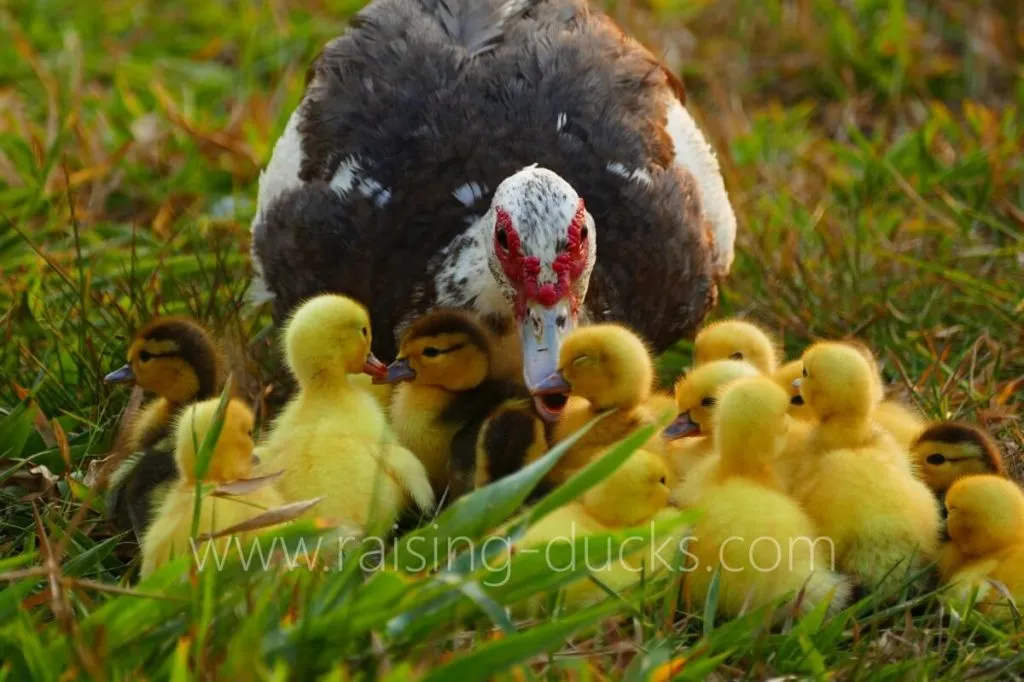
Muscovies are excellent mothers and very protective of their young.
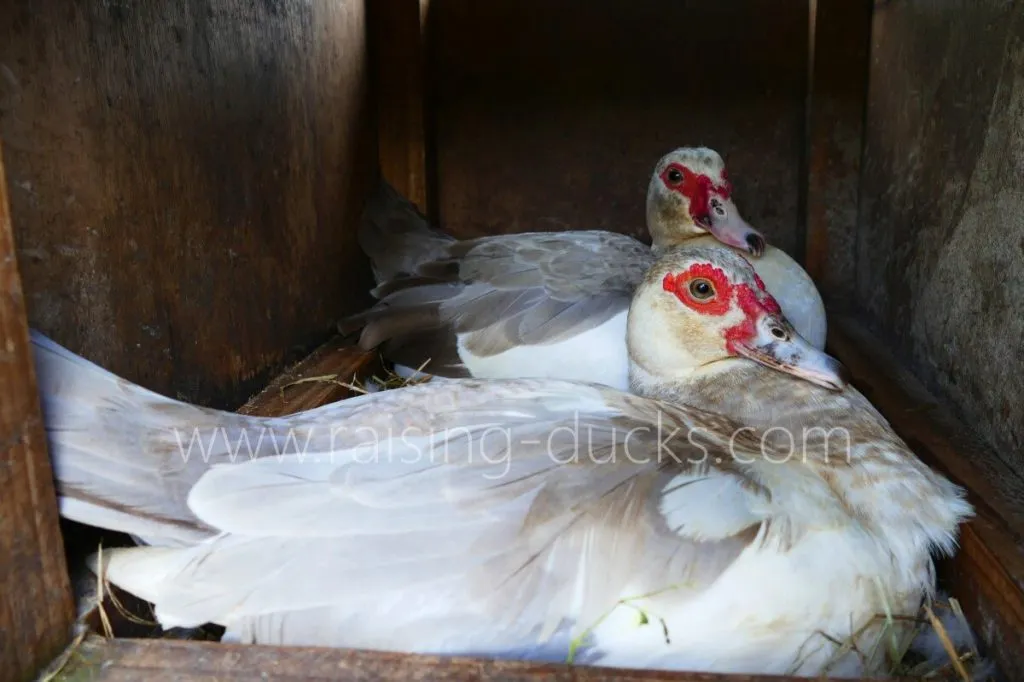
Muscovies go broody so often that it’s not uncommon to end up with two ducks broody in the same nest.
Muscovies can breed with other breeds of ducks, but the offspring will be infertile “mules.” Some people cross Muscovies with Pekins to produce a meat bird called a Mulard.
Muscovy meat is prized. It’s dark and delicious. It’s not fatty like the meat from many other ducks, and some people compare it to veal or even sirloin steak.
Some people say Muscovies are the most sweet-tempered breed of duck.
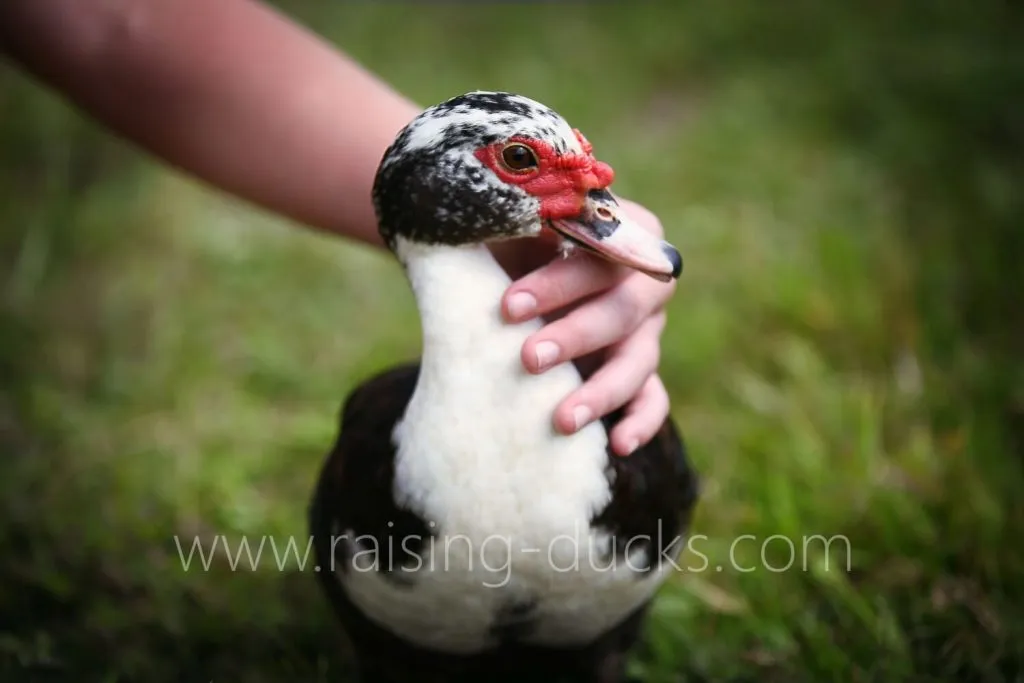
A friendly Muscovy duck named Sugar.
Others declare they are ferocious and aggressive. Broody ducks can be aggressive, and there are occasionally drakes that challeng or attack humans, but in general, they’re very docile and friendly. (If you have an aggressive drake, he CAN be cured. Read more here.)
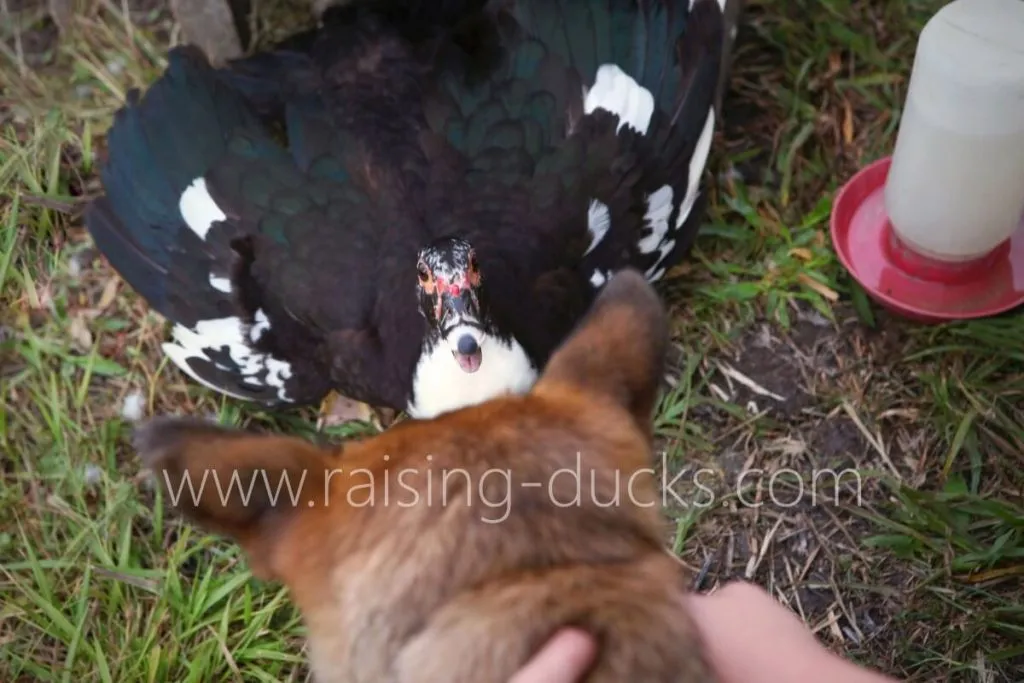
Lady hissing aggressively, ready to spring into action and save her ducklings from a curious puppy.
Some say they have more personality than other breeds of ducks.
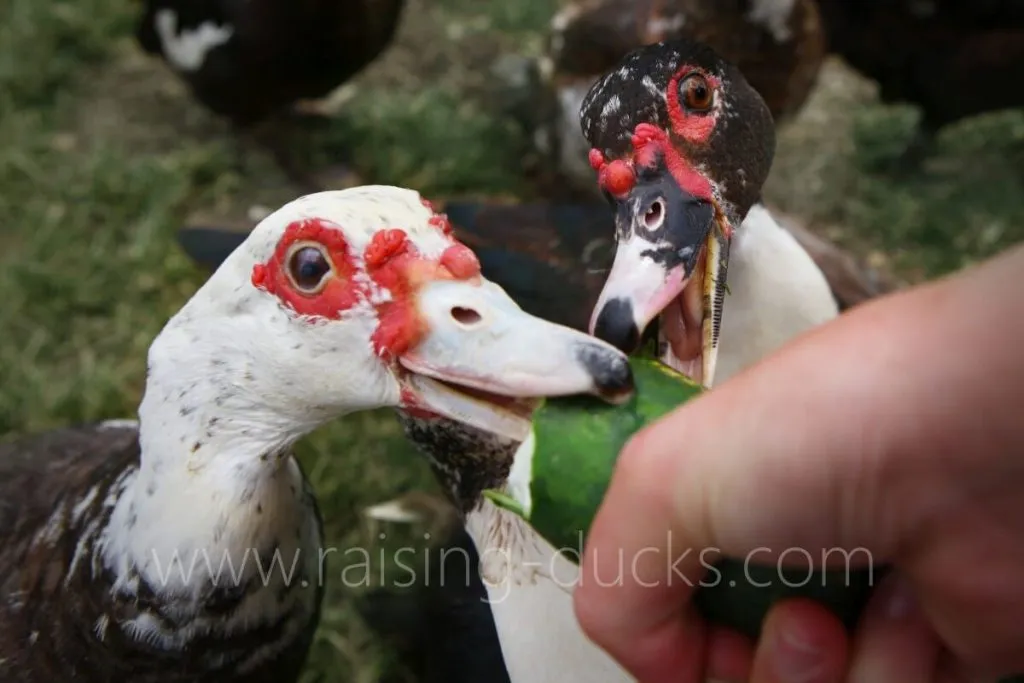
Muscovies were the first animals I ever raised. They are quiet, sweet, lay enough eggs for a family, have excellent meat, are good mothers, and make good pets.
I wholeheartedly recommend them.
Image Gallery
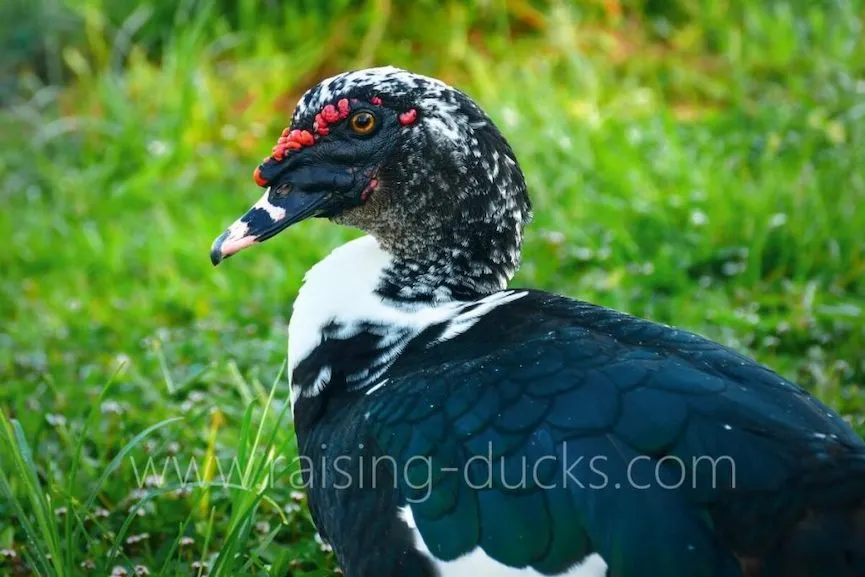
King, one of our Muscovy drakes.
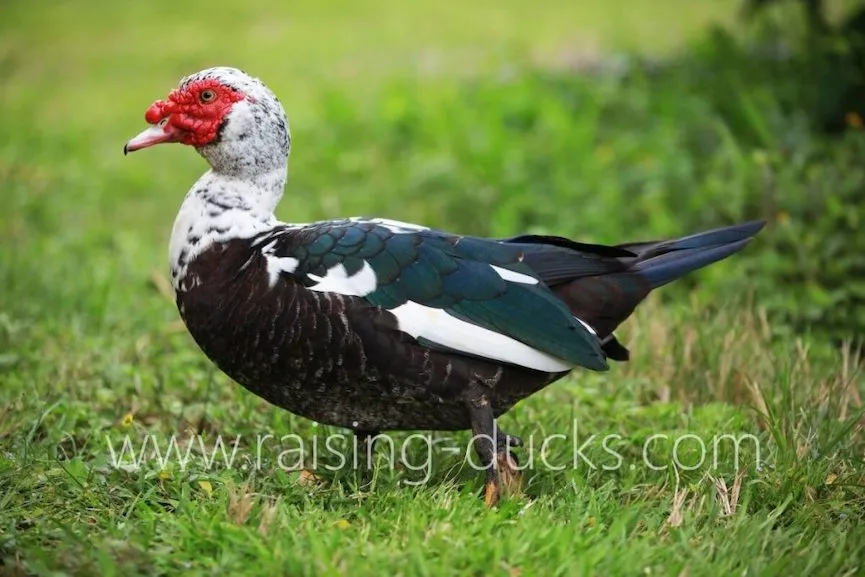
BB, another of our Muscovy drakes.
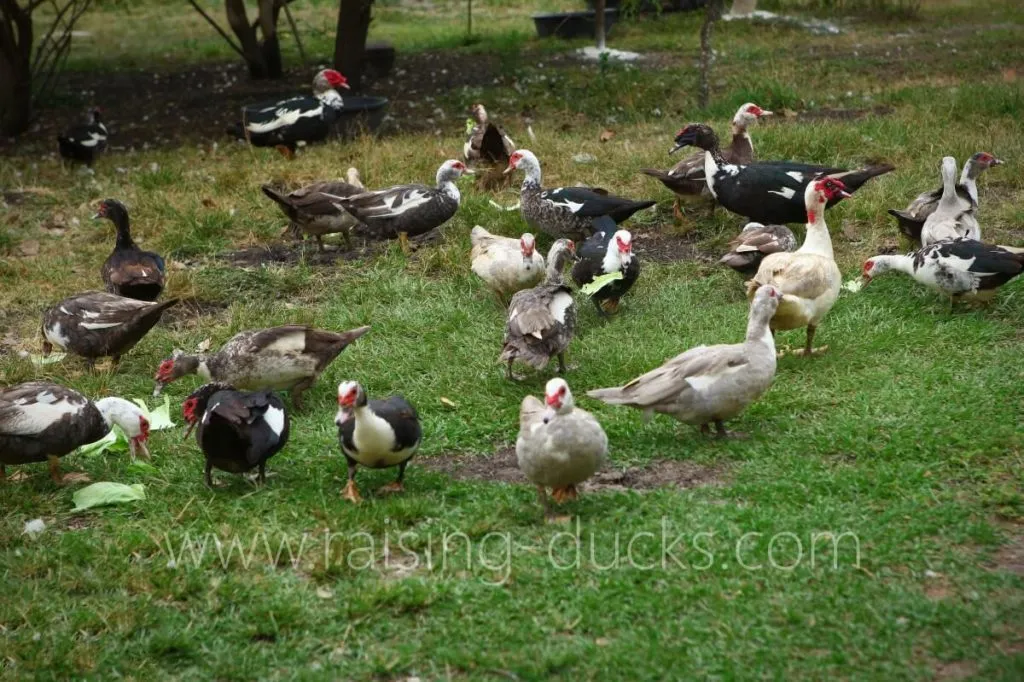
A flock of Muscovy ducks.
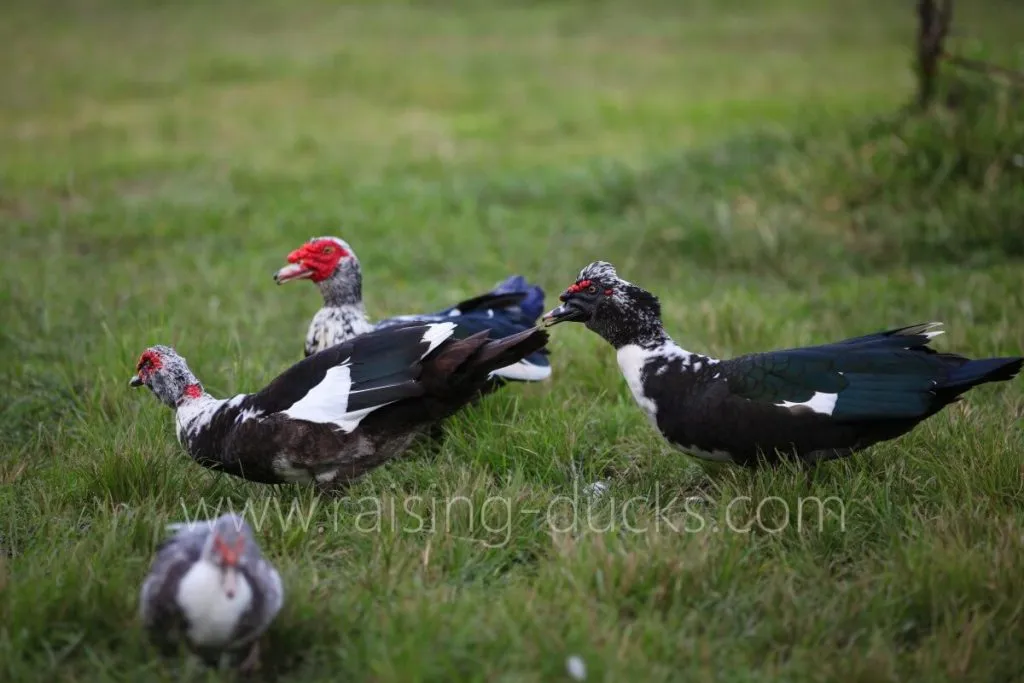
Three drakes talking.
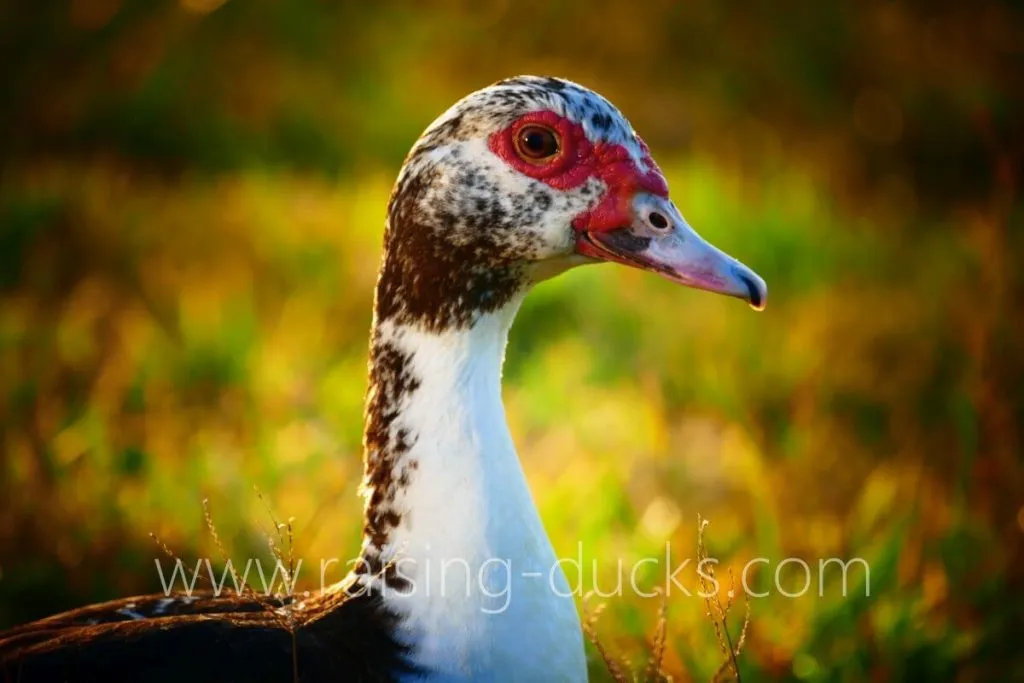
Snow
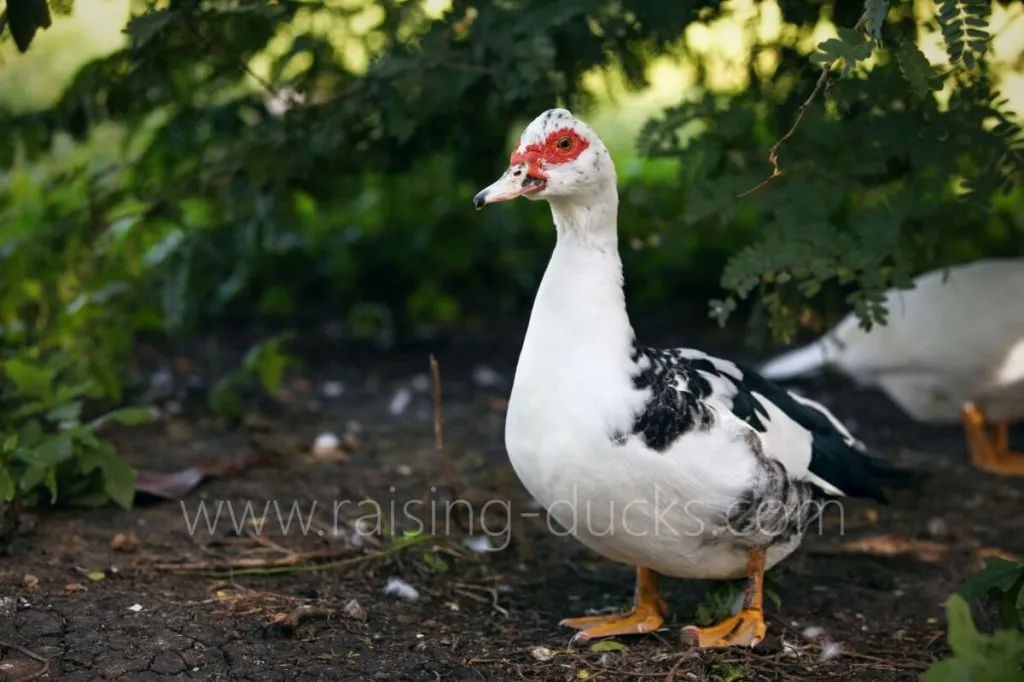
Snow (later in life—her head is all white now)
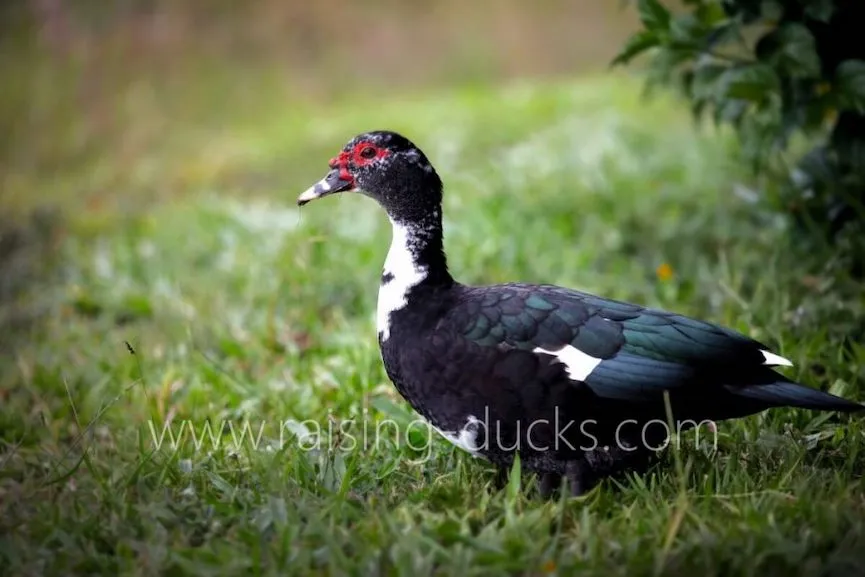
Cola
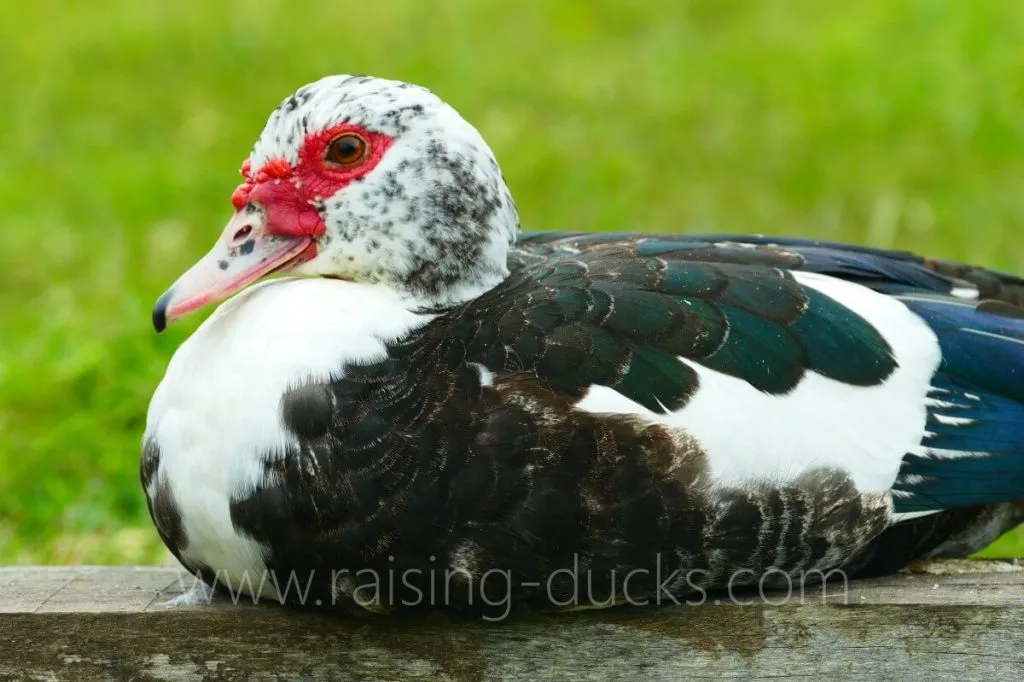
Bluebell
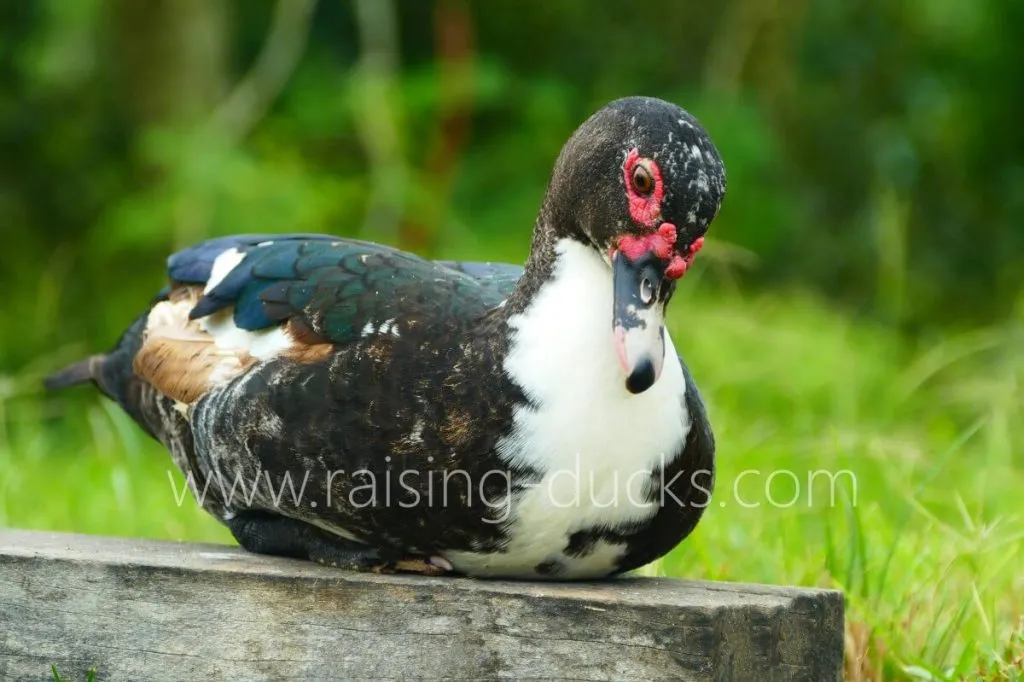
Fly
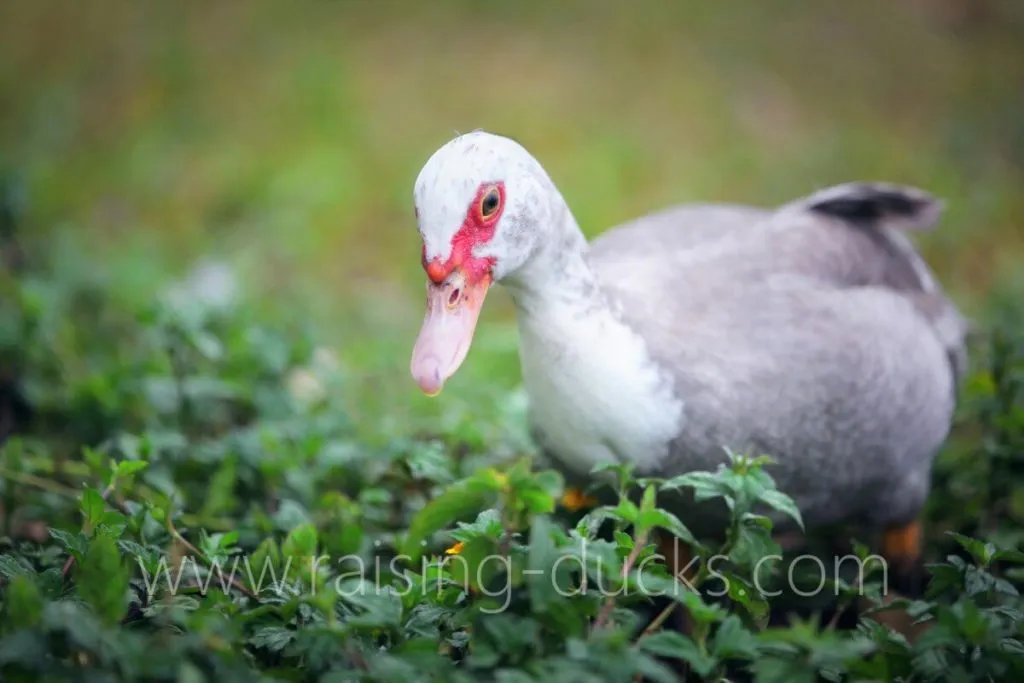
Trixie
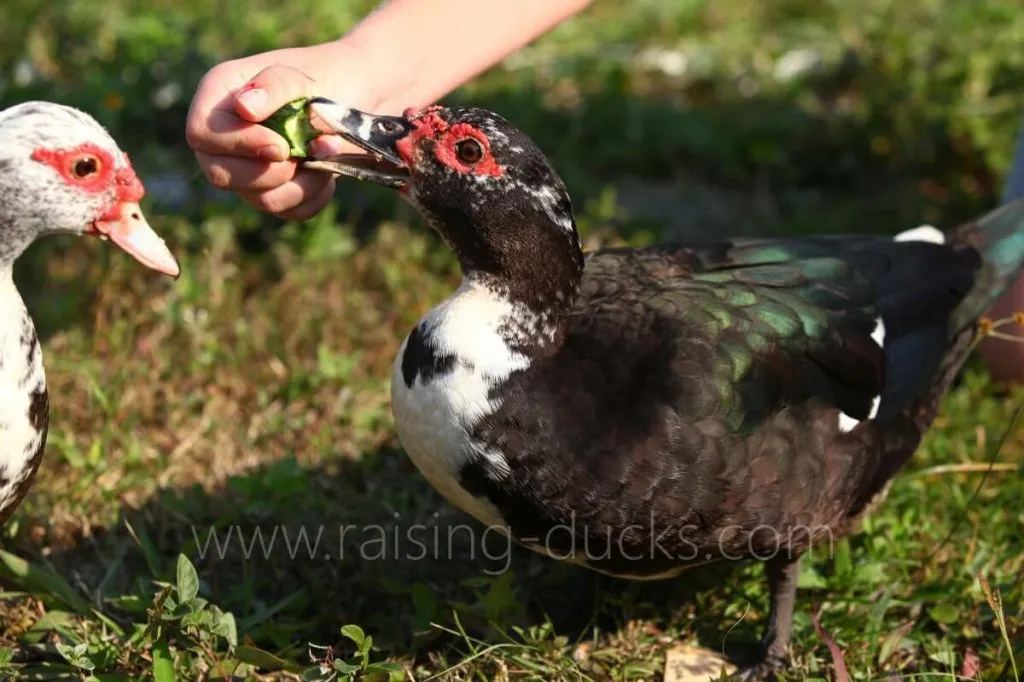
Cola enjoying cucumber
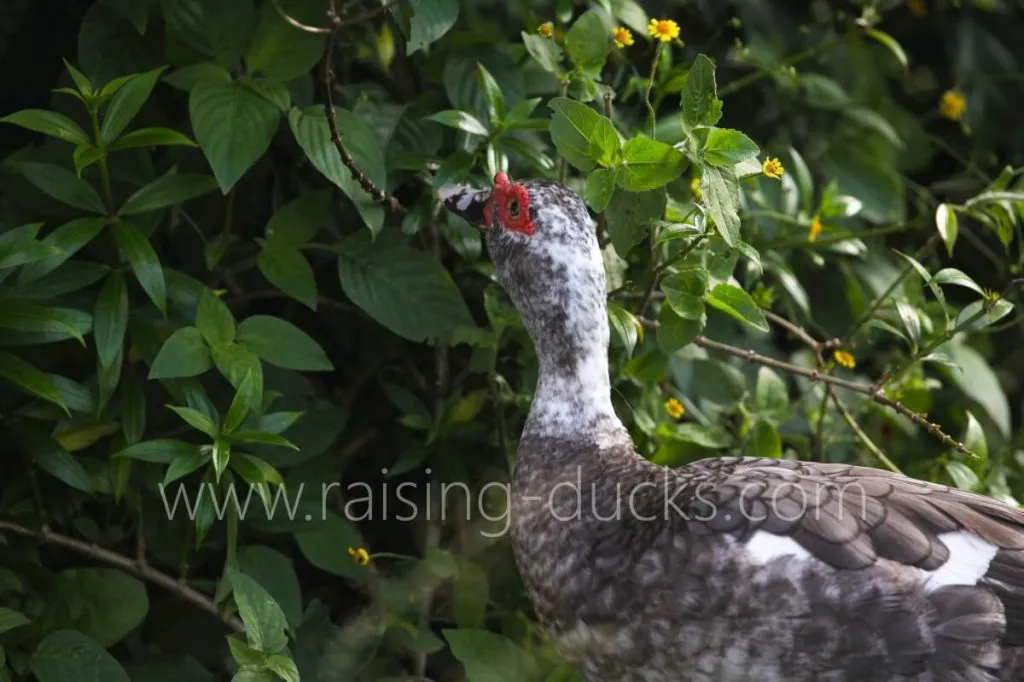
Moon foraging
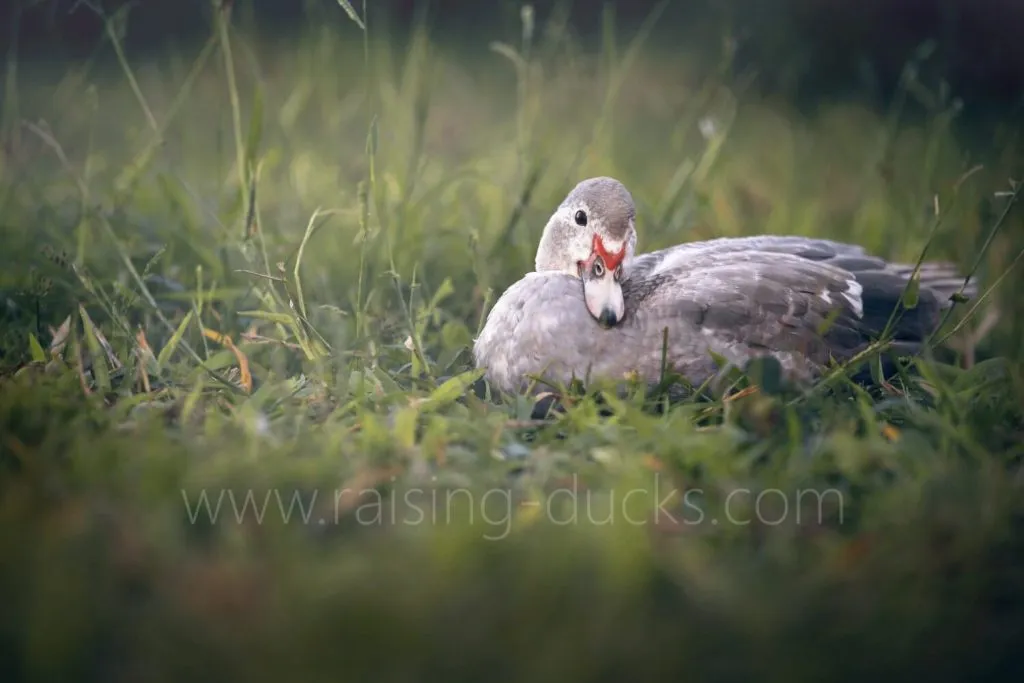
Mitzi, a juvenile
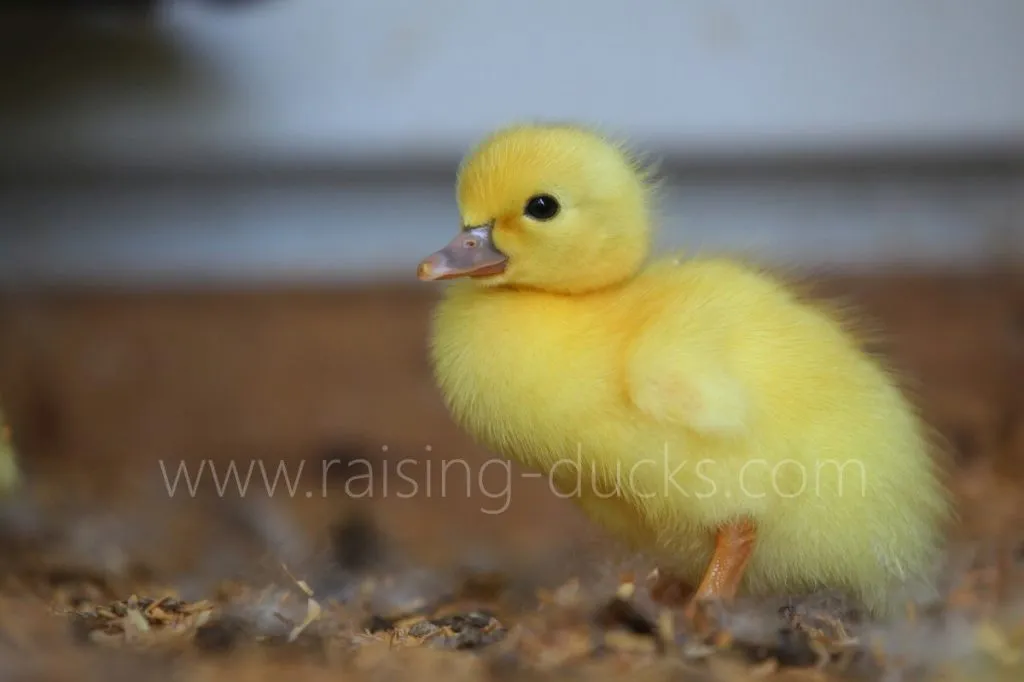
A duckling
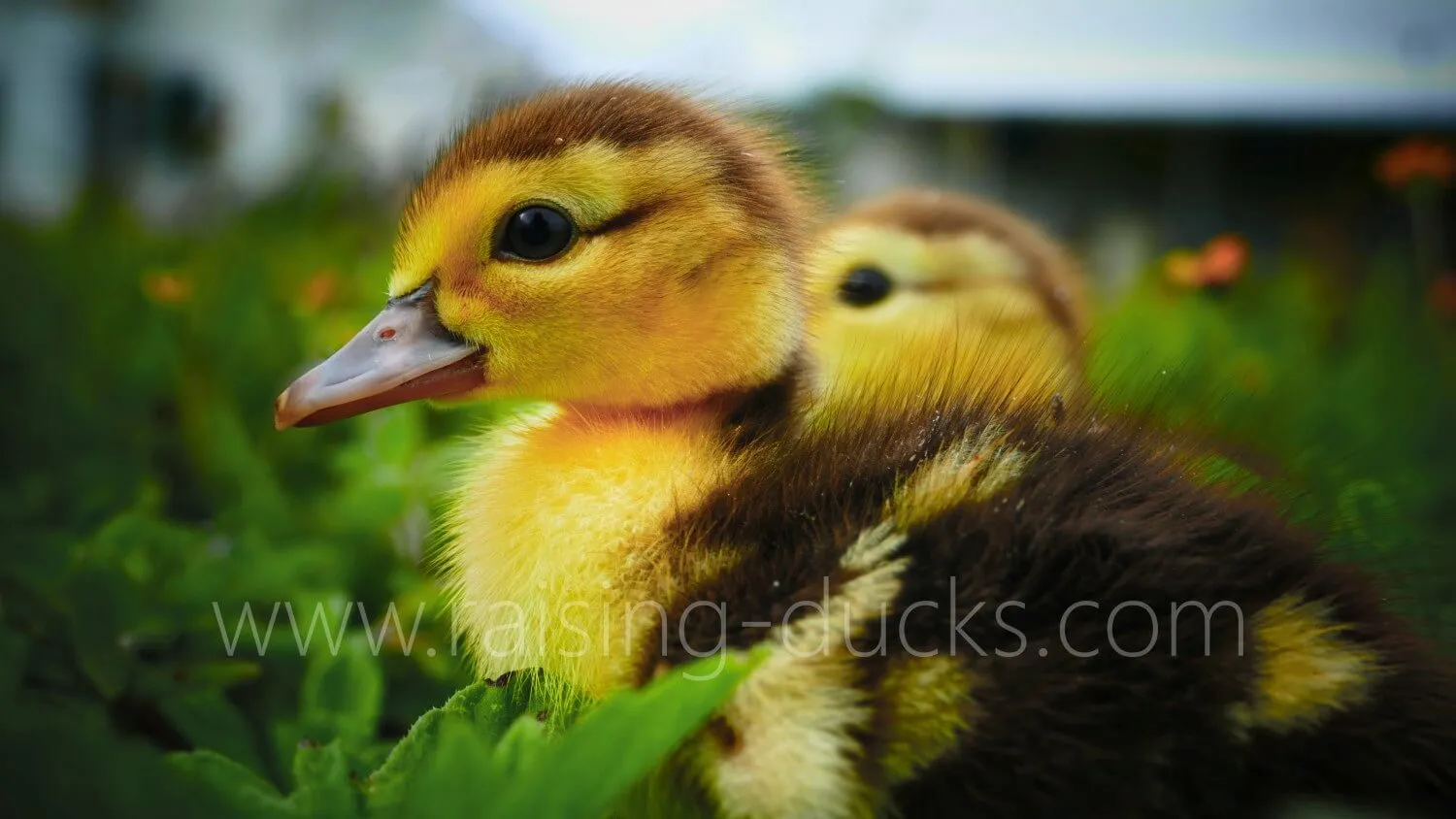
Another duckling
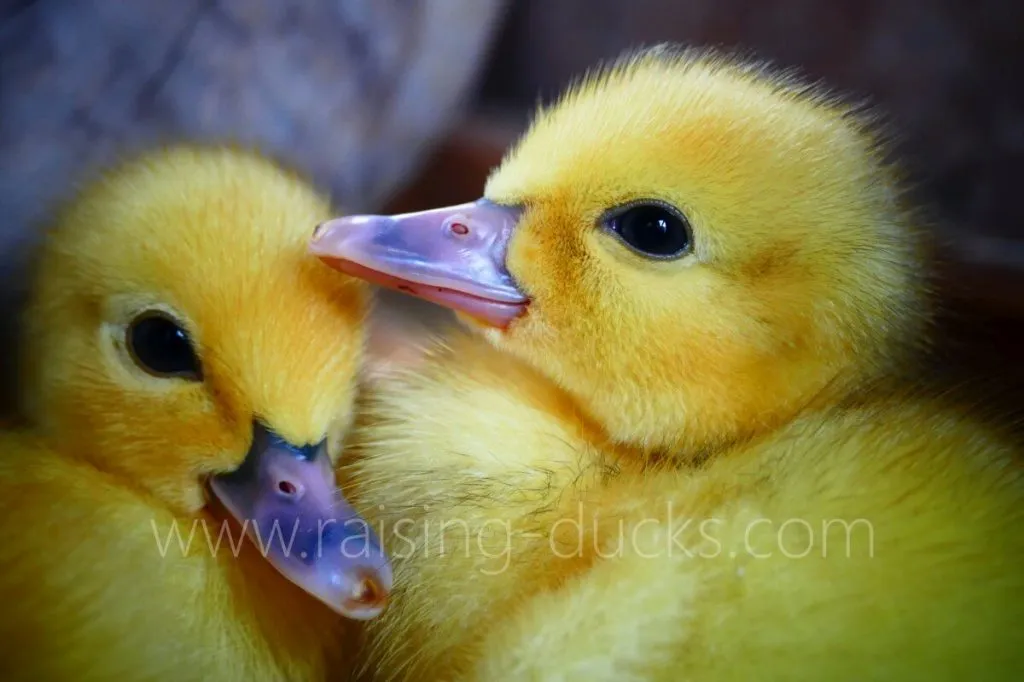
Two ducklings
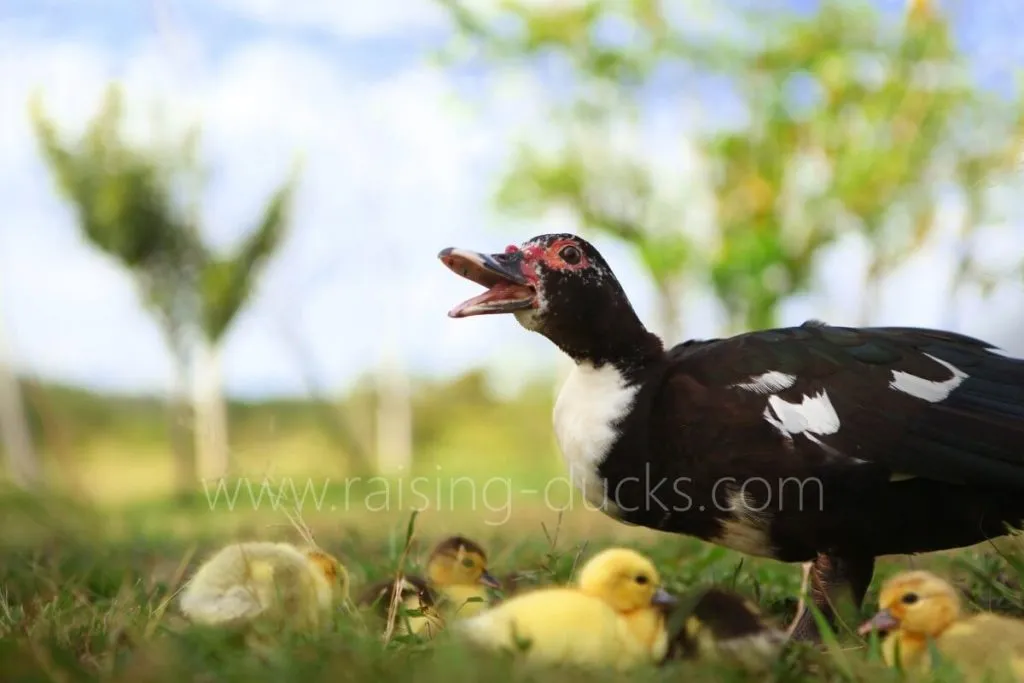
Lady protecting her ducklings
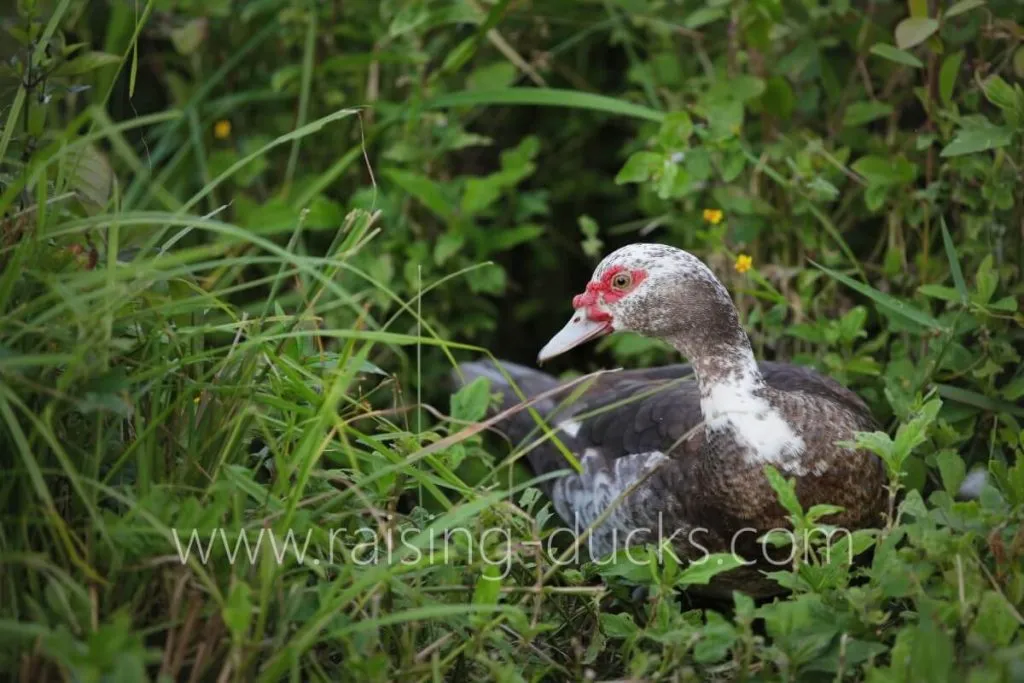
Gray foraging
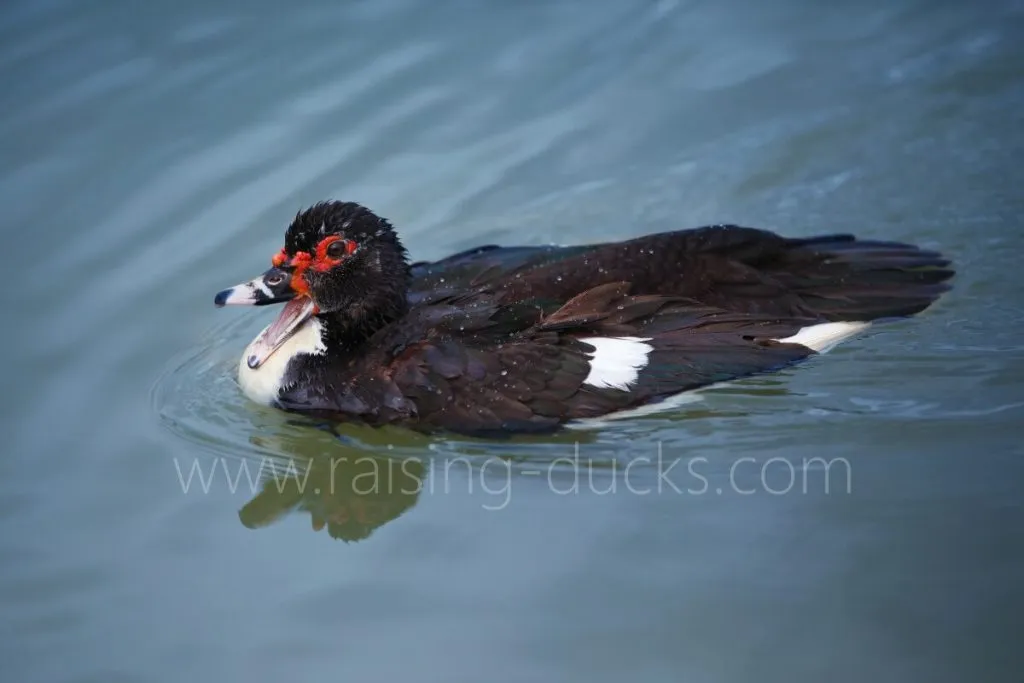
Mosquito bathing
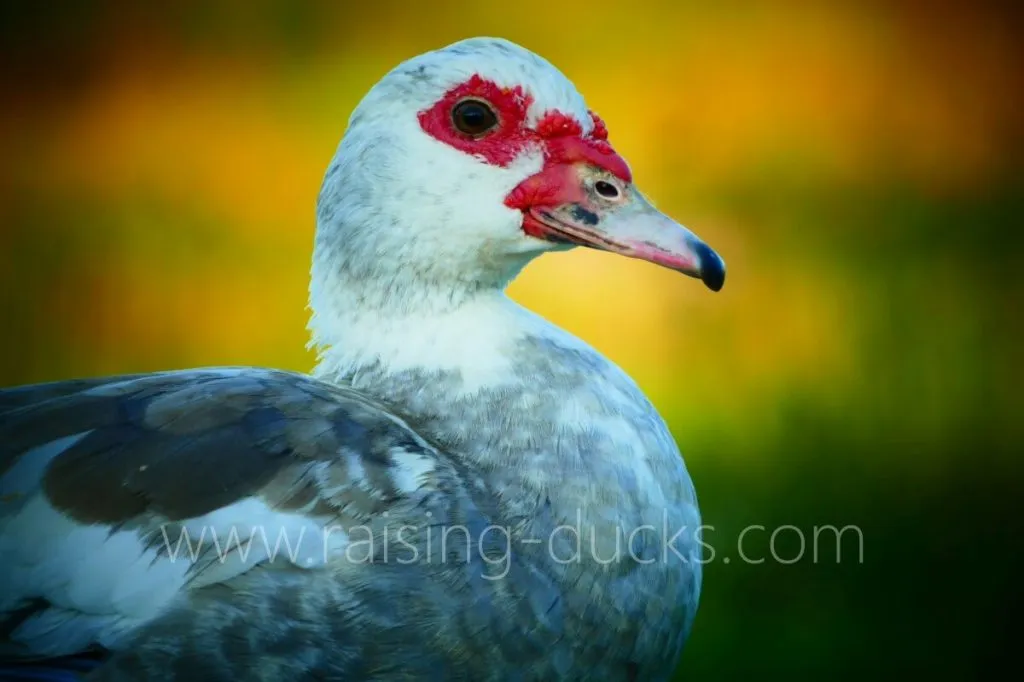
Mitzi
Leave a comment
Your email address will not be published.